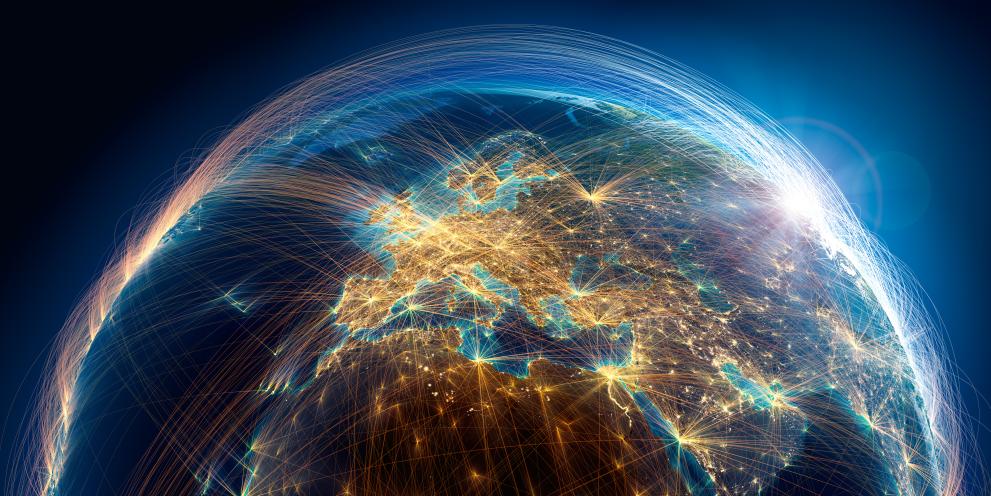
In the grand race to combat climate change, Europe stands tall, aspiring to lead the way towards a greener future. However, this ambition comes with a pressing question: how can Europe maintain its businesses’ competitive edge on the global stage while championing environmental sustainability?
The answer lies in a powerful combination: advanced manufacturing and electrification. Advanced manufacturing harnesses innovative technologies such as automation, robotics, and digitally connected solutions to enhance products and processes, catapulting industries into the future. On the other hand, electrification ties together multiple strands that are important to our industries, including decarbonisation of the energy system and the switch to renewables; a focus on energy and resource efficiency; the shift to smarter grids, smarter buildings and smarter transport; sector coupling; and new – ‘advanced’ – manufacturing processes.
This dynamic duo is not just about reducing emissions; it is about revolutionising the way industries operate. By embracing advanced manufacturing techniques, businesses can streamline production processes, use less critical resources, reducing energy consumption and waste along the way. Meanwhile, electrification can ensure that the energy used comes from carbon-neutral sources and unlock new efficiencies, further cutting down on harmful emissions.
What is more, Europe’s technology industries are at the forefront of this revolution. They are not only world leaders in advanced manufacturing and electrification technologies but also pioneers in shaping the future of sustainable industry.
To maintain this competitive advantage while we lead the journey towards climate neutrality, a well-crafted policy framework is indispensable. While some may argue that Europe has overreached in this endeavour, suggesting that the costs are too high, I firmly believe that the net-zero goal remains both valid and essential. However, it is time to adjust the instruments to get there. The next five years will be pivotal in this regard. Hence, we advocate for a fresh political agenda meticulously designed to establish the optimal conditions for unleashing the full power of Europe’s high-tech manufacturing potential. This includes policies that incentivise innovation, support clean energy infrastructure, and foster collaboration between industries and governments. As the driving force behind the technologies indispensable for achieving net-zero emissions, we have developed an agenda aimed at strengthening Europe’s high-tech manufacturing base.
Europe’s ambition to lead the net-zero transformation needs to be squared with the pressing need to safeguard its competitiveness and secure its economic resilience. It will not falter due to competitors’ policies. But it may falter if the right policy conditions are lacking at home. As Europe charts its course towards a greener future, it is clear that industrial innovation and electrification hold the keys to success. By embracing these technologies and creating an enabling environment for businesses to thrive, Europe can demonstrate that the fight against climate change can go hand in hand with a thriving economy. Together, let us make it happen.
Recommended links
- https://orgalim.eu/insights/technology-heart-delivering-net-zero-heart-europe
- https://orgalim.eu/position-papers/green-transition-orgalim-position-and-recommendations-communication-2040-climate
- https://orgalim.eu/insights/shaping-europes-climate-future-embracing-opportunities-and-addressing-challenges
- https://orgalim.eu/position-papers/industrial-policy-delivering-net-zero-transformation
About the author
Malte Lohan is the Director General of Orgalim, Europe’s Technology Industries, speaking for high tech manufacturing companies spanning the mechanical and electrical engineering, electronics, ICT and metal technology branches. Together they represent the EU’s largest manufacturing sector, generating annual turnover of around €2,906 billion, manufacturing one-third of all European exports and providing 11.19 million direct jobs.
Appointed Orgalim Director General in 2018, Malte is responsible for setting Orgalim’s strategy, acting as the senior representative of the European technology industries in Brussels and managing the operations of the association. He joined Orgalim from Anheuser-Busch InBev, the world’s leading brewer, where he held multiple roles including most recently Head of Corporate Affairs for AB InBev’s European region.
Malte has held numerous voluntary leadership positions, including President of the Society of European Affairs Professionals (SEAP), which represents the interests of the public affairs community in Brussels. Malte obtained his BA in philosophy and economics at the London School of Economics and went on to complete an MSc in political science at LSE. In 2016, he took part in a corporate MBA programme at AB InBev.
Disclaimer: This article is a contribution from a partner. All rights reserved.
Neither the European Commission nor any person acting on behalf of the Commission is responsible for the use that might be made of the information in the article. The opinions expressed are those of the author(s) only and should not be considered as representative of the European Commission’s official position.
Details
- Publication date
- 11 April 2024
- Author
- European Climate, Infrastructure and Environment Executive Agency
